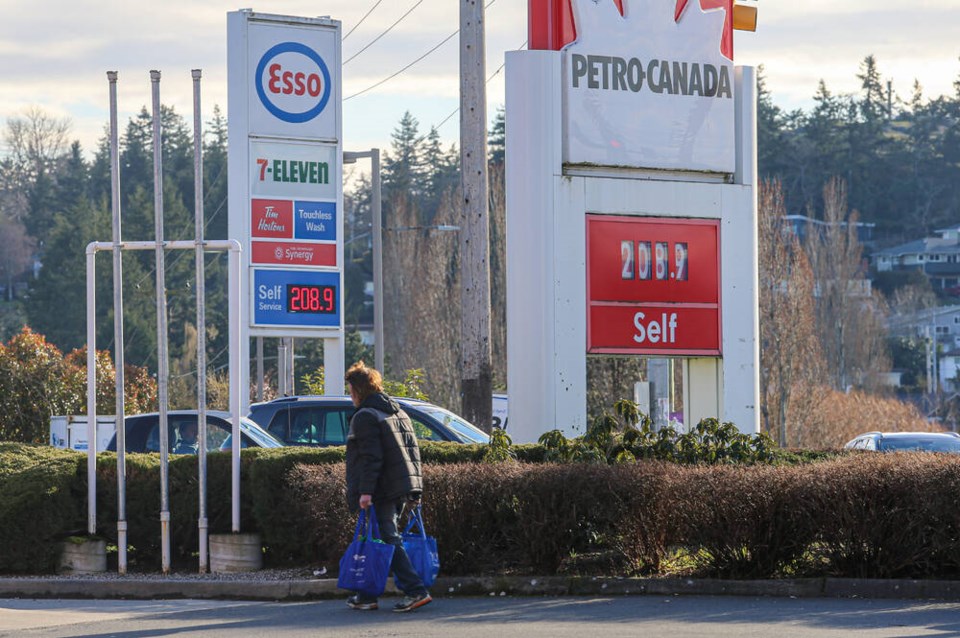A recent B.C. Supreme Court decision shows how bullet-proof oil companies are from attempts to force them to lower gas prices.
All the huffing and puffing by politicians about the price jumps could leave a few people with the impression that they might do something about it. But the NDP cabinet has been emoting about them off and on for years now and nothing much happened. The decision suggests there’s not much they can do.
Governments are junior partners in setting the pump price, given all the taxes imposed. Cutting taxes would be the easiest way to lower the pump price. But the NDP is increasing gas taxes, not cutting them.
The court decision rejected one individual’s attempt to sue oil companies for overcharging. Justice Warren Milman concluded there was no evidence of unconscionable behaviour and gas prices are a public policy issue, not for the courts to regulate.
Antonio Pantusa is a Vancouver man who wanted to bring a class action suit against six oil companies on grounds that pump price in B.C. has been inordinately high for years. As the justice summarized: “He attributes that excess cost to unconscionable pricing practices. … He says the defendants have been systematically overcharging their wholesale customers.”
The plaintiff wanted to represent a class comprised of everyone who bought gasoline in B.C. The potential scope of the case explains why 18 lawyers are listed as being involved in it.
The claim was that the companies abused their control of the gas market by agreeing to fix prices. They did that by imposing two surcharges on all wholesale gas sales. One was by way of an agreement to use the Pacific Northwest spot price as the main benchmark, even though the claim is that higher price should apply to only a fraction of the B.C. market. The other is that an additional overcharge was added that increased retail prices by 13 per cent “with no rational or economic justification.”
The case relied primarily on reports about gas prices by the B.C. Utilities Commission in 2019. The reports were ordered by the NDP cabinet during a time of rising prices. Pantusa’s case essentially presented the BCUC findings as evidence that the oil companies were violating competition law.
The BCUC concluded that B.C. gas prices have been rising since 2015 in a manner that is out of step with neighbouring markets in Canada and the U.S. There was a particular growing disparity between the Vancouver wholesale price and the Pacific Northwest spot price. It amounted to about 13 cents a litre that was termed the “unexplained difference.”
The pennies add up to millions, as the BCUC calculated that each cent extra cost drivers a total of $490 million in 2019. It said four companies control 88 per cent of the wholesale market and the situation met the definition of an oligopoly. But it concluded there was no evidence of the kind of misconduct that would draw the Competition Bureau’s attention.
The oil companies named in the suit denied any price fixing and pointed to other factors. One was the existing Trans Mountain Pipeline. Demand exceeds supply in B.C. so gas must be imported via the pipeline. But it carries various types of fuel and the amount of gasoline has been reduced since 2015, to make room for more crude oil.
They also cited the cost of complying with provincial regulations, like the low-carbon fuel standard, which is considered very stringent. Increases in production costs and other transportation costs were also cited.
The judgement centred on that unexplained difference. Justice Milman concluded: “Even accepting the proposition that wholesale gas prices in B.C. cannot be explained entirely … the BCUC merely found the discrepancy to be in an indication that the market is not sufficiently competitive. That does not mean the defendants’ wholesale pricing practices are unconscionable.”
He also said that even if the companies could have used market power to take advantage of consumers’ inability to protect their own interests, there was no evidence of any agreement among them to act in concert.
Just So You Know: Meanwhile, the B.C. Liberal opposition noted Tuesday it’s been 207 weeks since Premier John Horgan promised a range of options to curb gas prices. But the price just jumped to more than $2 a litre.
The government’s answer was the obvious one. Blame Putin, not us.
lleyne@timescolonist.com



